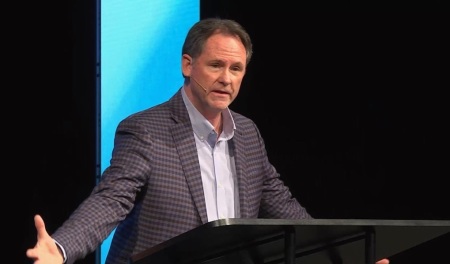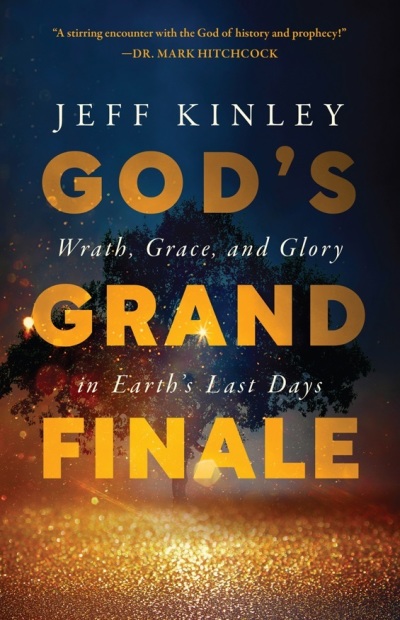‘God’s Grand Finale’: End Times expert says churches know little of the side of Jesus in Revelation

An author and expert on the End Times has released a new book detailing the nature of God as revealed in the New Testament book of Revelation, with the hope that it will help believers better understand who God is.
Jeff Kinley, co-host of the popular podcast “The Prophecy Pros” alongside Todd Hampson, released God's Grand Finale: Wrath, Grace, and Glory in Earth’s Last Days (Harvest Prophecy).
“The Bible’s last book is God’s final word to mankind—and the breathtaking revelation of our Lord Jesus Christ,” notes the book’s Amazon description.
“Though this letter describes depravity, devils, and destruction, it also provides an incredible portrait of our almighty God, delivering profound insights into who he really is.”
The Christian Post spoke with Jeff Kinley about his book on Friday, touching on topics like how Revelation is often misinterpreted and how Christians should approach the last book of the Bible. Here are lightly edited excerpts from that interview.
CP: You have written other books about the End Times. What would you say makes God's Grand Finale different from your earlier works?
Kinley: Well, this book specifically targets the book of Revelation not from just an apocalyptic standpoint explaining the End Times, but also revealing the character of God throughout the whole book.
The premise of God's Grand Finale is that God's last book that He ever wrote He wanted us to understand what was going to happen in the last days. But He also wanted us to know Who He was, as His final word to the Church. So, that really is the approach that is different from any book that I have ever seen written on Revelation.

CP: In Chapter 2, you warned against saying such things as “I don’t do theology. I just love Jesus," writing that "with such declarations, the church is plunged into a new dark age where ignorance and emotions become the guiding principles for the current generation of professing Christians." Would you say that it is also the case with the popular cliche of “Christianity isn't a religion. It's a relationship"?
Kinley: I'd say there's some similarity and overlap there. The basic idea is that we try to make God into our own image. We customized Jesus, if you will, to fit our preconceived thoughts about Him or emotions. We want to express love for God, but the basic premise of worship is that we cannot worship a God that we do not know. And it goes back to John 4 when Jesus told the woman at the well that God is searching for worshipers who will worship Him in spirit and in truth. And so, there has to be a theological foundation for Who God is before we can ever even love that God.
In order to truly love God, we have to first do a little bit of theology.
CP: Regarding the book of Revelation, you wrote that it is not "a riddle to be solved, but a revelation to be believed. It’s not a metaphoric tale laced with undecipherable symbols, but rather, a literal scene-by-scene depiction of history, to be written down in advance of its fulfillment." Do you believe a lot of churches have this misunderstanding about the book of Revelation?
Kinley: I do. I think people view Revelation as sort of being off limits to Christians because of its apocalyptic language, because some of its symbolism that's in there. Also, it’s ironic because number one, it is the last book God ever wrote, so you'd think that it would be an important book, which it certainly is. But the very word, "Revelation," means to uncover or reveal or to unveil, not to hide. So, the irony is that people think that it’s a book of hidden knowledge when the very title of the book tells us that it is a book that tells us Who God is and tells us what's going to happen.
And with a little bit of study and a little bit of guidance, it really isn't that hard to understand.
CP: You dedicated two full chapters to the topic of the letters sent to the seven churches mentioned in Revelation. Why did you believe that the topic needed to be covered in two chapters rather than just one?
Kinley: I think because Jesus' heart is for His bride, the Church. He loves His Church, He loves believers very, very much, and the thing He wanted most for those first century churches is for them to get their relationship, their doctrine, and their lives calibrated to Who God is, to God's character. The only way He could do that was to send some messages to them that would rebuke them for their error and then offer them a way back to Himself.
And so, five of the seven churches received severe rebukes from Christ, two did not. But I think they mirror many churches today. And so, that's why it’s so relevant for today because those seven churches, we can look around us today and say, 'Wow, there's that church, there's Ephesus, there's Smyrna, there's Sardis, there's Philadelphia, and so it’s a relevant section of the book. So, I wanted to spend more time on it.
CP: In the book, you pointed to the fact that John, the author of Revelation, used the word "like" to describe a lot of what he saw, as in comparable to. Do you believe a lot of people who read Revelation fail to consider this when trying to interpret what is written?
Kinley: I think it’s very important, as with all Bible interpretation, that we pay very close attention to the specific language and word choice that God uses in His Bible.
John does that. He sees things that are very futuristic that are not comparable to his first century experience. And so, he has to use words like "like" and word pictures and that type of thing, and that tells us that we don't exactly know what these things are going to look like or to be like. But then other times, John is very, very specific with his language. He gives us specific numbers, specific places, specific names, and specific descriptions of things, so not everything is vague, but some things for sure John wasn't able to put into his first century language.
CP: In Chapter 9, you described how Jesus will look and act at Armageddon, noting that "The risen Christ is the hero of the ages, a conqueror for all time. The world knows virtually nothing about this Jesus described in Revelation. And sadder still is that the church knows very little of this side of Jesus as well." Why do you believe that the church knows very little about this End Times side of Jesus?
Kinley: Two reasons. Number one, we tend to spend most of our time about Christ in the Gospels. And we get our vision, our image, our view of God from the Gospels. But the rest of the New Testament really tells us more about the character of God and Who Christ is. And when we get to Revelation, specifically chapter one, there's a vision of Christ there, but it's unlike anything we hear preached in most churches today.
By the time we get to Revelation 19, the close of the age, we see a Christ coming back to essentially, get rid of sin, get rid of sinners, to set the world right again. Which is really something that everybody wants to happen in their heart. They want evil to go away, they want righteousness to reign, justice and fairness, and Christ is going to bring that kind of Kingdom immediately following his second coming.
CP: At various times in the book, you outlined different perspectives on certain parts of Revelation, such as the identities of the two witnesses who prophesy, according to Revelation 11. Why did you believe it was important to describe different views on Revelation, even when you have a specific view that you prefer?
Kinley: Basically, because God doesn't fill in those blanks for us in the book of Revelation. So, it is hard to be completely dogmatic about some of our conclusions as to the identity of the two witnesses, for example. I think there are clues, there are hints, there are certain word choices and certain activities of the two witnesses that tend to mirror some of the former prophets like Moses and Elijah. But we're not told exactly, so we can't be 100% sure, but we can have at least some sort of a confidence in coming to that conclusion.
CP: What do you hope people take away from your book?
Kinley: The main thing is that they just know God and love Him more.
That's the last book of the Bible and God wants us to know Who He is. And Revelation was written so that we could know our God better. And so, that's what I want people to do: to know God, to love Him more as a result of this book.





















